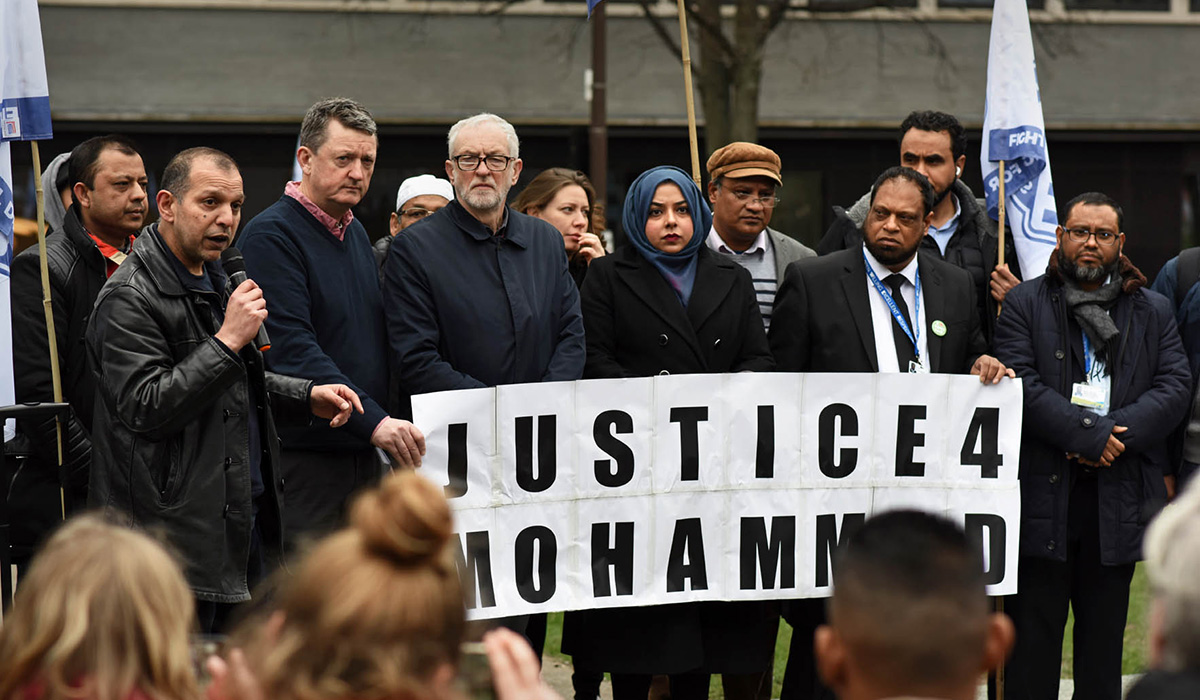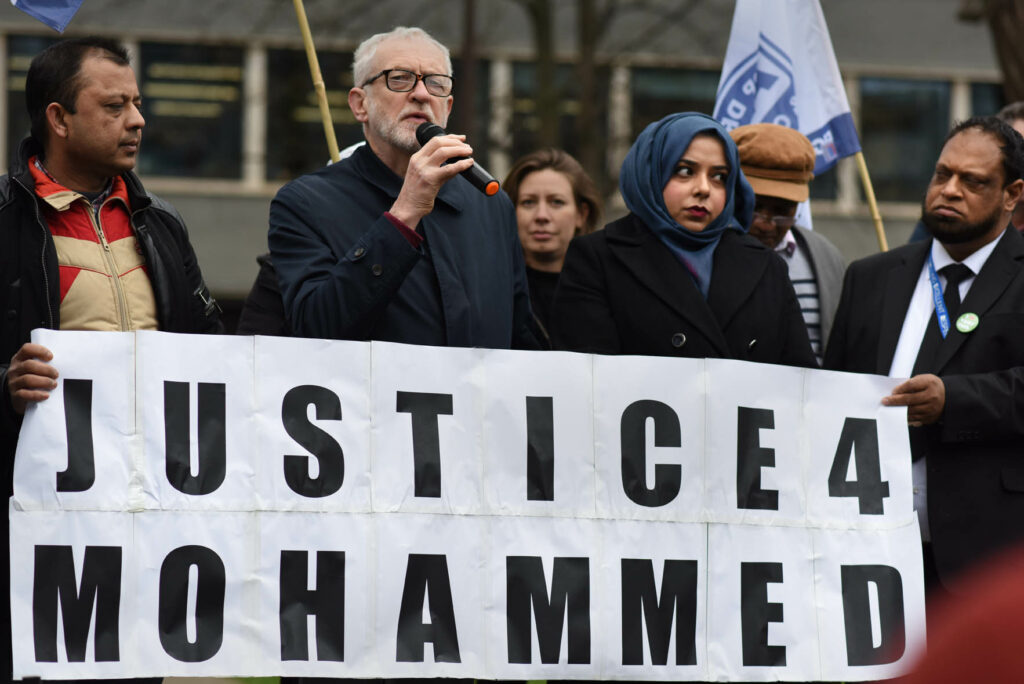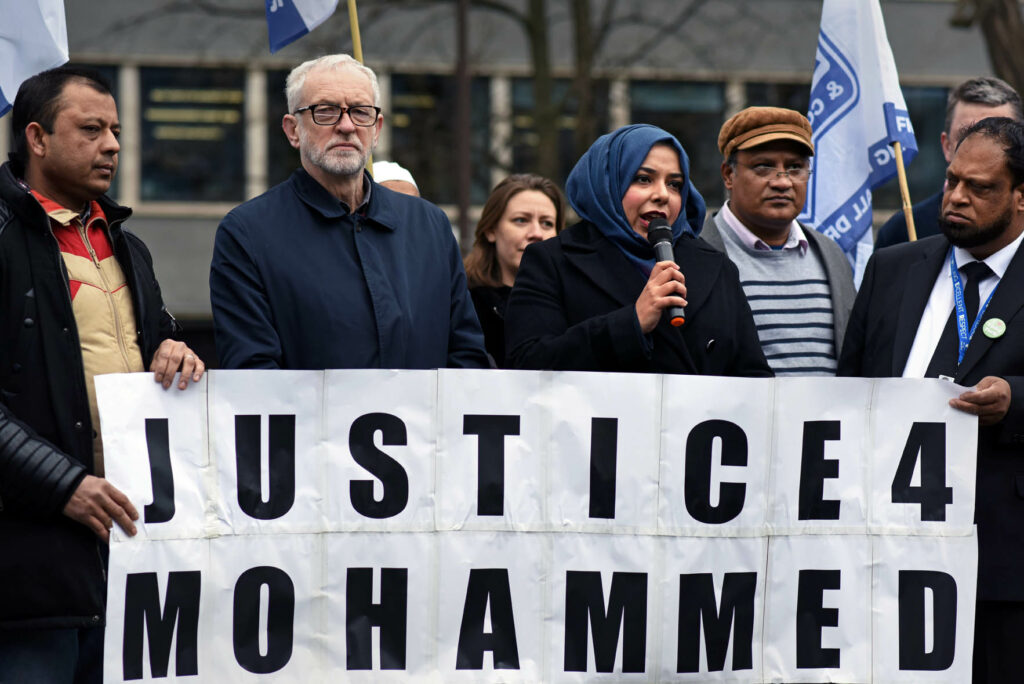 #Justice4Mohammed rally. Photo: Jim Aindow
#Justice4Mohammed rally. Photo: Jim Aindow
The demonstration for the Deliveroo driver who collapsed showed the importance of workers fighting together, reports Alia Butt
Last week, an app-based delivery driver working for Deliveroo became critically unwell on the job and collapsed outside a block of luxury flats in East London. A demonstration in support of Mohammed, who is still in hospital, was held by the ADCU (App Drivers and Couriers Union), and attracted local trade unionists and had speakers representing local and national working people.
A Deliveroo worker from Manchester reminded us that Mohammed’s experience is not an isolated one, and that many workers are living in conditions of insecurity and poverty, despite working long hours. Unjum Mirza highlighted that the setting for the catastrophe was particularly fitting, given it is a part of East London that demonstrates the stark distinction between those living in poverty and their wealthy neighbours. In Tower Hamlets, it is becoming easier to witness the wealth disparity only widening the gap between the rich and the poor in London, which has accelerated in recent years at a record rate.
Deliveroo rider Catherine Meechan addresses the crowd pic.twitter.com/A68k6W5auK
— Polly Smythe (@pollysmythe) March 3, 2023
Maium Talukdar, the area’s deputy mayor, pointed out that Mohammed’s experience is the result of a ‘system built on unchecked greed and exploitation’. Jeremy Corbyn MP and Apsana Begum MP from nearby constituency Poplar and Limehouse spoke of the need for radical change in how society is run and made poignant connections between what happened to Mohammed and what is happening in almost every working-class community and workforce across the country. The articulation of these connections is part of why we are seeing so many workers rise up against the shoddy conditions of work they have so long unwillingly continued to accept.


Onay Kasab from Unite spoke about food banks in hospitals for hospital workers. Food banks have become a means of subsidising the government’s responsibility to pay people enough for them to provide food for themselves and their families. Kasab went on to deliver the positive news that ambulance workers who are part of Unite have voted against the suggestion that pay negotiations can go ahead if workers agree to demands around ‘productivity and efficiency’. This is an important example of how we can stick to our demands to ensure they are met without compromise. Workers are not asking for too much, but for a chance to support themselves properly. It is their hard work that creates the profits from which those at the top are benefitting, while being allowed, by the government, to continue suppressing workers’ wages.
Onay Kasab, Unite lead organiser, addresses the crowd pic.twitter.com/3tk7OI6p7W
— Polly Smythe (@pollysmythe) March 3, 2023
Kasab reminded us that that the money and solutions are both there and that in the last year there has been £4.5bn spent on agency workers in the NHS. He stated that much of this money did not go to the workers it is supposed to be paying for, but in fact goes into the coffers of the private firms contracted by the government. He went on to suggest that £50bn should be allocated as a windfall tax out of the £170bn excess profits forecasted to be taken by energy companies over the next two years. This £50bn could deal with the so called black hole in economy and pay every single NHS worker a proper wage. Kasab also pointed out how much efficiency would be gained from the nationalisation of all the big companies carried out on the basis of democratic control, where workers have a say in how money is spent.
Link the struggles
Sadly, the tragic example of Mohammed and many before him enable us to see that neoliberal policies around trade and work are not only impacting lives through devaluing working people’s material living conditions, but also their worth as human beings, in the minds of the general public. Government policy paired with the use of technology has so intrinsically commodified workers into services rather than human beings, that consumers are able to both figuratively and literally step over their bodies, showing more consideration for whether or not their food order is correct, rather than whether the human being laying on the floor in front of them is breathing. James Farrar from the ADCU, who was at the scene of Mohammed’s collapse, recalled in his speech how he was led to asking customers who came down to do exactly that: ‘where is your humanity?’ This question should be put to the government.
@jamesfarrar general secretary of the App Drivers and Couriers Union tells Mohamed’s story pic.twitter.com/mtx9DLCTXs
— Polly Smythe (@pollysmythe) March 3, 2023
Shabbir Lakha, from the People’s Assembly Against Austerity stated that Mohammed’s case is ‘the product of companies grinding workers to the ground while paying workers peanuts for the privilege’, and made links to the Amazon workers – another abused workforce now finding power and strength in unity and unionisation – who recently faced disciplinary action for going to the hospital during work hours for suffering a burst appendix and a cardiac arrest. Lakha reminded us that our enemy is the same; it is the same group of exploiters, the very same government which is giving taxpayer money to the wealthiest in society rather than those who deserve and need it most.
Shabbir from the People’s Assembly, drawing links between Amazon workers and couriers pic.twitter.com/J8r1w50g0v
— Polly Smythe (@pollysmythe) March 3, 2023
Ultimately, what echoed through each of the speeches in Altab Ali Park was the call for unity between struggles, and the importance of solidarity in our fight back against a corrupt government. If we are to be successful, we need to see more days organised in the way 15 March is set to be, when we will be seeing workers from multiple industries withholding their labour, and therefore having a considerable impact on society’s functioning. Ultimately, society does not function without workers; it is the fat cats and bosses who are expendable, not those who make the profits for them.
Lakha stated that on 15 March we will be seeing collective action from hundreds of thousands of workers – teachers, civil servants, junior doctors, rail workers, university lecturers, and more – organising within and across unions and striking together to show this government that we are a force to be reckoned with.
Hopefully, this is only the beginning.
Before you go
Counterfire is growing faster than ever before
We need to raise £20,000 as we are having to expand operations. We are moving to a bigger, better central office, upping our print run and distribution, buying a new printer, new computers and employing more staff.

